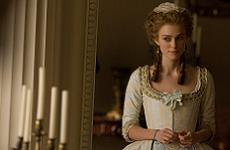
 |
| Photo © 2008 Paramount Vantage/Pathé/BBC Films |
| Academy Award Nominations and Winners: | |
| Best Art Direction: Michael Carlin; Rebecca Alleway | |
| ★ | Best Costume Design: Michael O'Connor |
| Golden Globe Nominations: | |
| Best Supporting Actor: Ralph Fiennes | |
| British Academy Awards (BAFTAs): Best Costume Design | |
| Permalink | Home | 2008 | ABC | Blog |